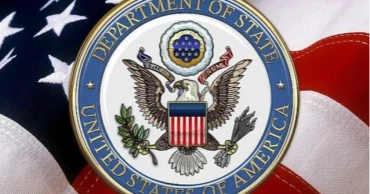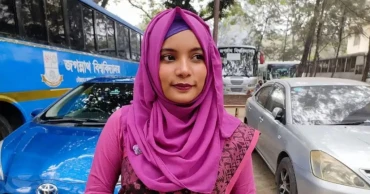Digital Security Act
All DSA cases withdrawn, no arrest without proof: Law Adviser
Law Adviser Dr Asif Nazrul has said all cases under the Digital Security Act (DSA) have been withdrawn.
While speaking at a dialogue, he said they have also instructed that no one should be arrested without substantial evidence.
The Centre for Governance Studies (CGS) hosted the dialogue at the CIRDAP Auditorium (Centre on Integrated Rural Development for Asia and the Pacific) to discuss reforms related to the mass media.
"While there may not have been much in the media, there has been a lot of misinformation spread on social media. None of us have filed cases over this misinformation, nor have we protested we’ve left it to the people of the country. If a certain group sees an opportunity for business in filing cases, then there’s nothing we can do about it," said the Law Adviser.
There were 266 cases filed against journalists, but only 15 were arrested, he said.
"Those who were named were charged for insider crimes or related amendments. We have no role in the cases they were filed by ordinary citizens," Asif Nazrul said.
Generate solar power by installing rooftop panels: Prof Yunus
Dr. Badiul Alam Majumdar, Chief, Electoral Reform Commission; Shafiqul Alam, Press Secretary to the Chief Adviser; Dr Shahidul Alam, founder, Drik Picture Library and photojournalist; Mojibur Rahman Monju, Chairman of AB Party; Ruhin Hossain Prince, General Secretary, Communist Party of Bangladesh (CPB); journalist Parveen F Chowdhury; Sohrab Hassan, Joint Editor, Prothm Alo; M A Aziz, Bangladesh Correspondent, Irrawaddy; Zahed Ur Rahman, political analyst; Dr. Shakhawat Hossain Sayantha, General Secretary, G-9, Bobby Hajjaj, Chairman, Nationalist Democratic Movement; Parvez Karim Abbasi, Assistant Professor, East West University, Senior Research Fellow, Centre for Governance Studies; journalists Md Muktadir Rashid; Zyma Islam and Qadaruddin Shishir spoke at the event.
Moderating the session, Zillur Rahman said the media and related institutions have not really discussed the issue of media reform or the commission’s report.
"There hasn’t been much discussion on television, nor have there been writings in newspapers. There’s been no dialogue on what kind of reforms are needed, how constructive the commission’s report is, or what its weaknesses are," he said.
Dr. Badiul Alam Majumdar said most television channels, in order to secure licenses, included favourable statements in their applications to please the government.
Committee formed to investigate last 3 polls during AL regime
He said their letters of commitment contained promises that aligned with the political ideology and strategies of the Awami League.
"In the application forms themselves, they expressed willingness to assist in implementing the political party’s vision. Based on these applications, licenses have been granted over the past fifteen years," he said.
Shafiqul Alam said they are going through an extraordinary time and claimed that the interim government has not created any administrative barriers to journalism.
Alam pointed out three main ways in which the last regime controlled journalism, through administration, repressive laws and social favours.
He said the current government is not doing any of that practices. Over the past fifteen and a half years under Hasina, a trust deficit has developed we are trying to overcome that.
"We are working to ensure that the actions of that era are not repeated during our time, and we’ve been largely successful in that regard. We’re not using any administrative pressure to silence journalists or push them away from their profession," Alam said.
EC seeks power to fix cut-off date for new voters, sends draft law to ministry
"If a news report is false, we simply say it’s false and request its removal. Some comply, some don’t. We’re just letting people know it’s untrue everyone can take their own legal steps. There are demands for a Journalist Protection Ordinance, but what about those who are harmed by unethical journalism? Shouldn’t we also think about protecting them?"
Dr Shahidul Alam said that practices of the journalism has lost credibility because they are not up to standards worldwide. He has expressed concerns that certain law enforcement agencies are exempt from giving information to the media which creates a barrier for journalists to create news.
He has brought up a case against him on the ICT act in 2018. Among the various laws like the DSA, CSA, and CPO, we’ve observed that there’s one area where no change has been made—political sentiments have been given a distinct and special status.
Mojibur Rahman Monju said, media gets stuck in the marketing department. That’s where the money is generated, where the revenue comes from. But in doing so, creativity gets stifled.
Ruhin Hossain Prince the journalism of Bangladesh has become a self-censored more than ever, the media houses are in a state of panic.
Pro Yunus urges early preparations for next year’s Hajj management
Shakhawat Hossain Sayantha has said that the journalists are divided between themselves, they don’t have unity amongst themselves.
Parvez Karim Abbasi has pointed out that there are many laws in place that are from an ancient time but are still in practice.
"Unless there is a shift in the mindset of the media, politicians, and academics, we won’t be able to bring about change in any area.
Zahed Ur Rahman said, What worries me is that our culture has deteriorated. Like many others, I don’t have high hopes that journalism or the media will suddenly be fixed."
Parveen F Chowdhury has said just having money should not be a gateway to open a media house.
Someone with experience and expertise should be able to get a license to start a media, she said, expressing dissatisfaction with the media in reporting as journalistic standards are not there.
7 months ago
Khadija sits for examination shortly after release from jail
Khadijatul Kubra, a student of Jagannath University (JnU) who was released from Kashimpur central jail securing bail in two DSA cases on Monday (November 20, 2023) morning, sat for an examination shortly after her release.
Khadija was released from Kashimpur Women's Prison at 9 am on Monday and went directly to Jagannath University to take part in the semester final exam.
Although the exam started at 10 o'clock, she entered the hall at 11:30 am. She sat the exam in the fourth semester with two semesters lost.
Her elder sister Sirajum Monira said, "We came to the prison early in the morning. Then Khadija was released at 9 am. Khadija's semester final exam starts today that's why we came early in the morning."
Read: No bar to release JnU student Khadija from jail as SC upholds HC bail
Earlier, Khadija secured bail last Thursday. The bail order reached the jail authorities on Sunday evening.
Despite waiting a long time on Sunday, her relatives had to return without her because she was not given the permission to release.
The Appellate Division of the Supreme Court (SC) on Thursday upheld a High Court (HC) order that granted bail her in two cases under the Digital Security Act (DSA) in 2020.
In October 2020, police filed two cases against Khadija and retired Maj Delowar Hossain at the Kalabagan and New Market Police Stations for 'spreading anti-government propaganda and harming Bangladesh's reputation.'
Read: Rally held to demand release of Khadijatul Kobra
The allegations in the two cases filed a week apart, were similar.
Police arrested Khadija on September 17, 2022. She had been in jail since then.
According to the case details, Khadija and Delowar conspired to broadcast false, fabricated, and defamatory propaganda about the Prime Minister, various government agencies, and senior state officials in order to oust the country's legitimate administration. They were aiming to destroy communal harmony through their conspiracy by promoting enmity, hatred, and division among various communities, it said.
Read: Students demand release of JnU student Khadija
Khadija was 17 when the cases were filed under the Digital Security Act in 2020, but the case was filed showing her as an adult, according to her lawyer. Despite having kidney disease, Khadija's bail petitions were repeatedly denied by a Dhaka court.
On February 23 this year, Khadija was granted bail by the HC in the cases. The state filed a petition challenging the bail.
On July 10 of the year, the Appellate Division suspended the bail of Kubra for four months in two cases.
During the hearing, Khadija's lawyer Barrister Jyotirmoy Barua argued that she was not accountable for the opinions expressed by guests in videos on her YouTube channel.
Read more: JnU student Khadija’s bail suspended for 4 months in DSA cases
2 years ago
JnU student Khadija walks out of jail after over 14 months
Jagannath University (JnU) student Khadijatul Kubra was released from Kashimpur Women's Jail after securing bail in two cases under the Digital Security Act (DSA).
She was released after more than fourteen months of her arrest.
Confirming the matter, Khadiza's sister Sirajum Munira said, "We came here early in the morning. Khadiza walked out of the prison at 9am. Her semester final exam is today. For this reason, we came here very early."
No bar to release JnU student Khadija from jail as SC upholds HC bail
Earlier, Khadija secured bail last Thursday. The bail order reached the jail authorities on Sunday evening.
Despite waiting a long time on Sunday, her relatives had to return without her because she was not given the permission to release.
The Appellate Division of the Supreme Court (SC) on Thursday upheld a High Court (HC) order that granted bail her in two cases under the Digital Security Act (DSA) in 2020.
JnU VC Prof Imdadul Haque passes away
A six-member bench of the Appellate Division headed by Chief Justice Obaidul Hassan passed the order after hearing a petition filed against the stay order of the Chamber Court.
In October 2020, police filed two cases against Khadija and retired Maj Delowar Hossain at the Kalabagan and New Market Police Stations for 'spreading anti-government propaganda and harming Bangladesh's reputation.'
The allegations in the two cases filed a week apart, were similar.
Police arrested Khadija on September 17, 2022. She had been in jail since then.
According to the case details, Khadija and Delowar conspired to broadcast false, fabricated, and defamatory propaganda about the Prime Minister, various government agencies, and senior state officials in order to oust the country's legitimate administration. They were aiming to destroy communal harmony through their conspiracy by promoting enmity, hatred, and division among various communities, it said.
JnU student Khadija’s bail suspended for 4 months in DSA cases
Khadija was 17 when the cases were filed under the Digital Security Act in 2020, but the case was filed showing her as an adult, according to her lawyer. Despite having kidney disease, Khadija's bail petitions were repeatedly denied by a Dhaka court.
On February 23 this year, Khadija was granted bail by the HC in the cases. The state filed a petition challenging the bail.
On July 10 of the year, the Appellate Division suspended the bail of Kubra for four months in two cases.
During the hearing, Khadija's lawyer Barrister Jyotirmoy Barua argued that she was not accountable for the opinions expressed by guests in videos on her YouTube channel.
Cases filed under DSA will continue, Law Minister tells Parliament
2 years ago
Int'l groups urge Bangladesh govt to drop DSA cases against journalists
In a collective plea for press freedom and human rights, 19 international organisations have urged the administration of Prime Minister Sheikh Hasina to halt cases initiated under the Digital Security Act (DSA) against journalist Adhora Yeasmean.
This urgent appeal follows an investigation into Yeasmean's video report for a private TV channel RTV on alleged activities of the religious organization Rajarbagh Darbar Sharif, which led to accusations against her under the DSA.
Read : Cabinet approves Cyber Security Act to replace controversial DSA
The coalition of organizations has also expressed alarm over reports of harassment targeted at Yeasmean by members of Rajarbagh Darbar Sharif. They allege that since mid-July, she has been subjected to unauthorized surveillance, threats, and intimidation. These actions are believed to be retaliatory against her investigative journalism. The coalition insists that authorities swiftly investigate these threats, hold the culprits accountable, and ensure the journalist's safety and psychological well-being.
The coalition also calls for Bangladesh to terminate the DSA investigation into Akramul Ahsan Kanchan, a co-accused in Yeasmean's report. Kanchan claimed that Shakerul Kabir, the leader of Rajarbagh Darbar Sharif, acquired local properties deceptively. The coalition views this legal backlash against journalistic sources as a threat to press freedom.
Read : DSA amended to prevent misuse of law: Quader
Bangladeshi Journalists in International Media (BJIM), a platform of Bangladeshi journalists covering the country for various global media outlets, also endorsed the letter and urged authorities to drop any investigation into Adhora Yeasmin.
“Press freedom is vital for a thriving democracy, allowing voices to be heard and truths to be revealed,” stated BJIM spokesperson Redwan Ahmed. “We urge Bangladeshi authorities to cease using the criminal justice system to harass or intimidate journalists and to drop charges against Adhora Yeasmin for her journalistic work.”
Amid the January 2024 election, the groups stress free journalism without fear, noting the DSA's repeal but cautioning against the new Cyber Security Act's threats to expression. The coalition also calls for involving stakeholders to shape rights-respecting legislation, underscoring the need to drop charges against expression and release detainees under the DSA.
Read : No journalists will be harassed by Cyber Security Act: Law Minister
Organisations who have signed the letter are Amnesty International, ARTICLE 19 South Asia, Asian Human Rights Commission, Bangladeshi Journalists in International Media, Capital Punishment Justice Project, CIVICUS: World Alliance for Citizen Participation, Coalition For Women In Journalism (CFWIJ), Committee to Protect Journalists, Forum for Freedom of Expression, Bangladesh, Free Press Unlimited, IFEX, International Federation for Human Rights (FIDH), International Federation of Journalists (IFJ), International Women’s Media Foundation, PEN America, PEN Bangladesh, PEN International, Reporters Without Borders, and Robert F. Kennedy Human Rights.
2 years ago
US encourages Bangladesh govt to enable stakeholders to review the draft Cyber Security Act
The United States has welcomed the Bangladesh government's decision to reform the Digital Security Act.
“We welcome the Bangladesh government’s long-stated commitment to reform the law, to protect freedom of expression,” US State Department Spokesperson Matthew Miller told reporters at a regular briefing in Washington on August 7.
Read: Cyber Security Act could be deadlier than DSA: Rizvi
He said the US encourages the government of Bangladesh to give all stakeholders an opportunity to review and provide input on the new draft Cyber Security Act, to ensure that it meets international standards.
“As we’ve previously stated, the Digital Security Act has been used to arrest, detain, and silence critics,” the US State Department spokesperson said.
Read: TIB guardedly welcomes Cabinet’s decision to scrap DSA
2 years ago
Digital Security Act to be replaced by Cyber Security Act 2023
The government of Bangladesh has decided to replace the Digital Security Act with Cyber Security Act 2023, in which sections of the existing law will be amended.
Law, Justice, and Parliamentary Affairs Minister Anisul Huq confirmed the development today (August 07, 2023).
Read: ARTICLE 19 concerned by DSA case against RTV reporter
The decision came after a meeting of the Cabinet Division chaired by Prime Minister Sheikh Hasina this morning, he added.
The cabinet approved the draft in principle, the law minister said.
The name of the law has been changed, and some sections of the law have been amended, the minister added.
Read more: Digital Security Act to be amended: Law Minister
The minister further said that after the amendment, there will no longer be any provision for jail term; only the provision of fines will be kept.
Prime Minister Sheikh Hasina's government is working for the people, he said, adding, "We have taken measures to stop the misuse and abuse of DSA through some amendments."
Earlier on May 3, Anisul Huq said that Digital Security Act will not be repealed but necessary amendments will be made.
The DSA was enacted on October 8, 2018 with the aim of preventing the spread of sectarianism, extremism, terrorist propaganda, and hatred against religious or ethnic minorities through social media, print media or any other electronic media.
However, since its inception, DSA was criticized heavily for its misuse.
2 years ago
JnU student Khadija’s bail suspended for 4 months in DSA cases
The Appellate Division on Monday suspended bail of Jagannath University student Khadijatul Kubra for another four months in two cases under the Digital Security Act(DSA).
An Appellate Division bench led by Chief Justice Hasan Foez Siddique passed the order.
Advocate BM Elias Kachee and Barrister Jyotirmoy Barua stood for Khadija, while Assistant Attorney General Saiful Alam represented the state.
Students demand release of JnU student Khadija
Khadija was granted bail by the High Court on February 16 in two Digital Security Act cases. The state filed petition challenging the bail.
During the hearing, Khadija's lawyer Barrister Jyotirmoy Barua argued that she was not accountable for the opinions expressed by guests in videos on her YouTube channel.
The Appellate Division responded that Khadija, “as a first-year honours student, should be able to accept responsibility for the opinions aired on her talk show program.”
Steps taken to prevent misuse of DSA: Law Minister
In October 2020, police filed two cases against Khadija and retired Maj Delowar Hossain at the Kalabagan and New Market Police Stations for 'spreading anti-government propaganda and harming Bangladesh's reputation.'
The allegations in the two cases filed a week apart, were similar.
Police arrested Khadija on September 17, 2022. She has been imprisoned since then.
Over 7,000 cases under DSA: Law Minister
According to the case details, Khadija and Delowar conspired to broadcast false, fabricated, and defamatory propaganda about the Prime Minister, various government agencies, and senior state officials in order to oust the country's legitimate administration. They were aiming to destroy communal harmony through their conspiracy by promoting enmity, hatred, and division among various communities, it said.
Khadija was 17 when the cases were filed under the Digital Security Act in 2020, but the case was filed showing her as an adult, according to her lawyer. Despite having kidney disease, Khadija's bail petitions were repeatedly denied by a Dhaka court, he said.
2 years ago
Bangladesh behind both Pakistan and Afghanistan in World Press Freedom Index 2023
Bangladesh has ranked 163rd out of 180 nations, according to Reporters Without Borders’ (RSF) World Press Freedom Index 2023.
Bangladesh is behind both Pakistan and Afghanistan in this year’s index – with Pakistan ranking 150th and Afghanistan ranking 152nd.
According to RSF: “The Digital Security Act (DSA) is one of the world’s most draconian laws for journalists. It permits searches and arrests without any form of warrant, violation of the confidentiality of journalists’ sources for arbitrary reasons… In this legislative environment, editors routinely censor themselves.”
“Most of the leading private media are owned by a handful of big businessmen who have emerged during Bangladesh’s economic boom. They see their media outlets as tools for exercising influence and maximising profits, and they prioritise good relations with the government over the safeguard of editorial independence,” it adds.
From previous year: B'desh slips 10 notches in RSF press freedom index
The World Press Freedom Index’s analysis for Bangladesh further says: “In the past decade, radical Islamist groups have waged extremely violent campaigns that have led to journalists being murdered. These groups now use social media to track down journalists who defend secularism, the right to alternative opinions or religious freedom.”
Asia, in general, did not fare well when it comes to press freedom. India ranked 161st and China ranked 179th in the World Press Freedom Index.
Regarding India, the index’s observations are: “Modi has an army of supporters who track down all online reporting regarded as critical of the government and wage horrific harassment campaigns against the sources. Caught between these two forms of extreme pressure, many journalists are, in practice, forced to censor themselves.”
Reporters Without Borders noted that India has seen a significant decline in press freedom in recent years, with increasing threats and attacks on journalists, while China remains “one of the world’s most repressive countries” when it comes to media freedom.
Read More: Repeal DSA, demands TIB marking World Press Freedom Day
“The same trend can be found in Bangladesh (163rd) and Cambodia (147th), where governmental persecution of independent media has intensified in the run-up to elections that are due to be held in the coming months,” it says.
The top ten countries in the index, with the highest press freedom, are: Norway, Ireland, Denmark, Sweden, Finland, Netherlands, Lithuania, Estonia, Portugal, and Timor-Leste.
These countries have strong democratic institutions and robust legal frameworks that protect the freedom of the press and the right to information.
The report highlights the need for governments to prioritize the protection of journalists and the promotion of press freedom as a fundamental human right.
It also calls on the international community to take action to hold governments accountable for violating these rights and to support independent journalism around the world.
Read More: Hasan trashes RSF report on press freedom as malicious & unacceptable
2 years ago
Repeal DSA, demands TIB marking World Press Freedom Day
Transparency International Bangladesh (TIB), a civil society watchdog, has again called for the repeal of the Digital Security Act on the occasion of World Press Freedom Day.
The Bangladesh chapter of Transparency International, which fights corruption globally, also called upon the government to create a congenial environment to ensure all basic rights including security of life of the media workers.
The organisation made the demands at a media release signed by its Director (Outreach and Communication) Sheikh Manjur E Alam on Tuesday.
TIB Executive Director Dr Iftekharuzzaman said, “The government should ensure a congenial environment for the media so that they can perform their duties without any obstruction as the fourth pillar of the country.”
He said although the number of media increased in the country remarkably, on the other hand fearless journalism also decreased.
Read more: Free journalist Shams, repeal DSA: TIB
“They are being obstructed due to harassment, attacks and lawsuits by the use of state mechanisms under the shadow of those in power,” he said.
The TIB executive director noted that Bangladesh slid 10 places in the ‘2022 World Press Freedom Index’, placing 162nd out of 180 countries. The 2023 index is slated for release this week by Reporters Without Borders, also known by its French acronym RSF (Reporters sans frontières).
Iftekharuzzaman alleged that the DSA has been abusedleading to journalists being implicated in one out of every four cases filed under the act.
Journalists now engage in self-censorship due to attacks on the media workers, lack of justice and fear of the DSA, he added.
2 years ago
DSA in Bangladesh is much better than in Western countries: PM Hasina
Prime Minister Sheikh Hasina has said that her government is looking into and examining similar digital security laws in the United States of America, United Kingdom, European countries and beyond to learn how they are applied in those countries – noting that Bangladesh’s law is much simpler than others.
The PM made the remarks during an interview with Voice of America’s Bangla service.
She said that if someone is creating social unrest or jeopardizing national security or imparting training on militancy and making bombs online than strict action must be taken accordingly.
“If someone, known as a journalist, tries to steal a file from a ministry, should that person be rewarded? If you do it in any civilized country, what action is taken against that person?” – the PM said.
Read More: Arson terrorists, killers must not grab power again: PM Hasina
“Despite being caught red-handed, the journalist was labelled a hero and awarded,” she observed.
“While the whole world was in total disarray due to Covid-19, and we were discussing buying vaccines, an official caught the file thief…. That person then became a hero and was rewarded. If this happened in any other country, developed or civilized, what would they have done?” – the Prime Minister posed the question.
The PM said law on digital security does not only exist in Bangladesh; the US and UK also have such laws.
“People in Bangladesh are using the internet and mobile phones more than ever. Out of 17 crore people, 12-13 crore have SIM cards,” she said.
Read More: PM Hasina seeks long-term US partnership to build Smart Bangladesh
“There are so many issues… so many… teaching online how to make bombs, how to kill people… these need to be stopped. I think this should be given special attention internationally. Action needs to be taken against those who are involving children and teenagers online in such crimes,” said the Prime Minister.
However, she said, the Bangladesh government is quite vigilant regarding the Digital Security Act. “In our country, there was a law earlier, when military dictators were in power, under which any journalist could be arrested without summons. After I (Awami League government) took over, I stopped this.”
“So, this is not a case of journalists being harassed. If anyone is involved in anti-social activities or militancy, generally action is taken against them,” the Prime Minister told Voice of America.
Read More: Extradition of convicted Tarique Rahman depends on UK govt: PM Hasina
2 years ago



















